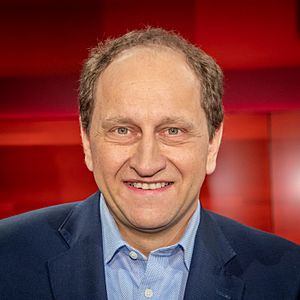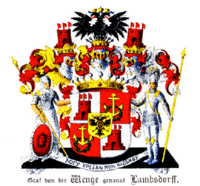Alexander Graf Lambsdorff facts for kids
Quick facts for kids
Alexander Graf Lambsdorff
|
|
|---|---|
 |
|
| Member of the Bundestag for North Rhine-Westphalia |
|
| In office 24 October 2017 – 8 July 2023 |
|
| Succeeded by | Katharina Willkomm |
| Constituency | FDP List |
| Member of the European Parliament for Germany |
|
| In office 1 July 2004 – 2017 |
|
| Personal details | |
| Born |
Alexander Sebastian Léonce
von der Wenge Graf Lambsdorff 5 November 1966 Cologne, West Germany (now Germany) |
| Political party | Free Democratic Party |
| Spouse | Franziska Gräfin Lambsdorff |
| Children | 2 |
| Alma mater | University of Bonn Georgetown University |
Alexander Graf Lambsdorff (born 5 November 1966) is a German politician and diplomat. He is currently serving as the German ambassador to Russia since 2023.
Before becoming an ambassador, Lambsdorff was a member of the Bundestag (Germany's parliament) from 2017 to 2023. He also served as a Member of the European Parliament (MEP) from 2004 to 2017. His family has a long history, and his name includes a noble title from the past.
Contents
Early Life and School
Alexander Lambsdorff grew up in different cities, including Hamburg, Brussels, and Bonn. He went to a Catholic high school called Aloisiuskolleg in Bonn until 1985. After high school, he studied at the University of Bonn.
Later, from 1991 to 1993, he studied in the United States at Georgetown University. He earned two master's degrees there: one in history and another in Foreign Service.
Working as a Diplomat
After finishing his studies and training to become a diplomat, Alexander Lambsdorff worked in various roles. He was part of the German Policy Planning Staff, which helps plan Germany's foreign policy. He also worked for former German Foreign Minister Klaus Kinkel.
Here are some of his early diplomatic roles:
- 1994: He was a trainee at the European Commission.
- 1994–95: He worked for the Friedrich Naumann Foundation in Tallinn, Estonia.
- 1997–2000: He was part of the Policy Planning Staff at the German Federal Foreign Office.
- 2000–03: He served as a Press Attaché at the Embassy of Germany, Washington, D.C. in the USA.
- 2003–04: He worked in the Political Department, focusing on Russia, at the German Federal Foreign Office.
Political Career
Member of the European Parliament (2004–2017)
Alexander Lambsdorff was first elected to the European Parliament in 2004. He was re-elected in 2009 and 2014. The European Parliament is where elected representatives from different European Union countries work together.
He was highly respected and became the leader of the 12-member German FDP group in the European Parliament in 2011. In 2014, he was chosen as one of the fourteen Vice Presidents of the European Parliament. In this role, he helped lead meetings and represented the Parliament at international organizations like the United Nations.
Lambsdorff also led EU-Election Observer Missions several times. These missions watch elections in other countries to make sure they are fair. For example, he oversaw elections in Kenya (2007–08), Bangladesh (2008), Guinea (2010), and Myanmar (2015).
Member of the German Bundestag (2017–2023)
From 2017 to 2023, Alexander Lambsdorff was a member of the German Bundestag. This is Germany's main parliament, where laws are made. During his time in the Bundestag, he was one of the deputy leaders for the FDP political group. He focused on foreign policy for his party.
He also led the German-Israeli Parliamentary Friendship Group, which works to build good relationships between the two countries' parliaments.
Roles within the FDP Party
Alexander Lambsdorff has held several important positions within his political party, the FDP.
- He was a founding member of the FDP LV Net.
- He served on the Executive Committee for North Rhine-Westphalia.
- He was also a member of the Federal Executive Committee.
He played a key role in talks to form new governments. For example, he helped negotiate the coalition agreement in North Rhine-Westphalia in 2017. He also led his party's team for foreign policy talks after the 2021 national elections.
German Ambassador to Russia
Since 2023, Alexander Lambsdorff has been serving as the German Ambassador to Russia. This means he is Germany's top diplomat in Russia. His job is to represent Germany's interests and maintain relations between the two countries.
In March 2024, he attended the funeral of Russian opposition leader Alexei Navalny. Also in March 2024, Russia's foreign ministry called him in for discussions after a recording of German military officials was published.
Political Views
European Cooperation
Lambsdorff has often spoken about how he sees Europe working together. He has become more critical of Turkey joining the European Union. He believes talks should stop until Turkey's government changes its direction.
He also commented on the European debt crisis in 2011. He suggested that the European Commissioner for Economic and Monetary Affairs should have more say over how countries in the Eurozone manage their money.
Human Rights
Alexander Lambsdorff supports human rights. He helped nominate Leyla Yunus, a human rights activist from Azerbaijan, for the Sakharov Prize in 2014. This prize is given to people who have made great efforts for human rights and freedom.
Language
In 2014, Lambsdorff suggested that English should be an official language in Germany, alongside German. He thought this would help attract more skilled workers and make it easier for businesses and investors. He believed it would create a more welcoming culture.
Other Activities
Alexander Lambsdorff is involved in many other organizations outside of his main political and diplomatic roles. These include:
- Deutsche Gesellschaft für Internationale Zusammenarbeit (GIZ), where he is a member of the Board of Trustees.
- Trilateral Commission, a group that brings together leaders from North America, Europe, and Asia.
- German Council on Foreign Relations (DGAP), where he is a member of the Presidium.
- Development and Peace Foundation (SEF), where he is a member of the Board of Trustees.
- Atlantik-Brücke, an organization that promotes German-American relations.
- European Council on Foreign Relations (ECFR), a think tank that focuses on European foreign policy.
- Friedrich Naumann Foundation, a foundation linked to his political party.
- German Institute for International and Security Affairs (SWP), a research institute.
Personal Life
Alexander Lambsdorff belongs to the noble Lambsdorff family. His family came from Westphalia to the Baltic region a long time ago. They owned large areas of land in what is now Latvia and Estonia. Many family members were military officers in the Russian Empire. One of his ancestors was given the title of Count in 1817.
His father, Hagen Graf Lambsdorff, was also a diplomat. He was the first German Ambassador to Latvia and later to the Czech Republic. Alexander's uncle, Otto Graf Lambsdorff, was a well-known liberal politician and a Federal Minister for Economic Affairs.
In 1994, Alexander Lambsdorff married Franziska von Klitzing. They have two children together.
See also
 In Spanish: Alexander Lambsdorff para niños
In Spanish: Alexander Lambsdorff para niños


